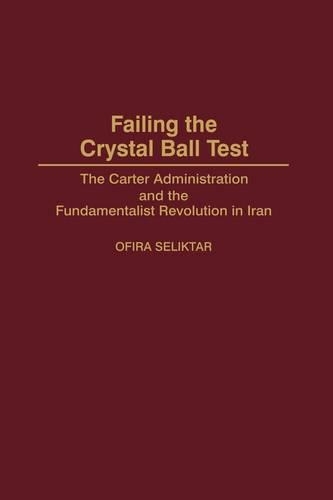
Failing the Crystal Ball Test: The Carter Administration and the Fundamentalist Revolution in Iran
(Hardback)
Publishing Details
Failing the Crystal Ball Test: The Carter Administration and the Fundamentalist Revolution in Iran
By (Author) Ofira Seliktar
Bloomsbury Publishing PLC
Praeger Publishers Inc
30th August 2000
United States
Classifications
Tertiary Education
Non Fiction
International relations
Revolutionary groups and movements
Revolutions, uprisings, rebellions
327.55073
Physical Properties
Hardback
272
Description
With the Iranian revolution as her focal point, Seliktar offers a systematic analysis of predictive failure in foreign policy at the paradigmatic, policy, and intelligence levels. Seliktar first examines how social science paradigms determine conceptualizations of political change, and then applies that analysis to understanding New Internationalism, the Carter administration's foreign policy philosophy at the time of the Shah's fall from power. Based in part on classified documents seized during the takeover of the American embassy, Failing the Crystal Ball Test is a valuable addition to Middle Eastern studies, international relations, and comparative politics collections. Seliktar engages in a general discussion of the problems entailed in correctly assessing the political legitimacy of foreign regimes, and describes the origins of New Internationalism as influenced by the New Left dependency theories. Examining President Carter's application of New Internationalism to Iran, Seliktar presents an account first of political influences on the predictive process during the early stages of revolution, and then of the administration's misreading of the likelihood of a fundamentalist regime in Teheran.
Reviews
"[A]n excellent and in-depth study of how policy-maker's views can blind them to what is happening. A must read for both academics and policy officers who seek greater understanding of cross-cultural clashes."-John D. Stempel Director and Professor of International Studies University of Kentucky
"A rare and valuable case study of foreign policy-making in the eye of a political hurricane. It is also a trenchant critique of the two-dimensional tradition of academic and professional political analysis that could not cope intellectually with the non-rational' factors of religion, culture and national psychology that dominated the Khomeini upheaval."-Joseph V. Montville Director Preventive Diplomacy Program
.,."the author provides a sound theoretical base for understanding Carter's dilemmas toward Iran. Recommended for students and specialists alike. Upper-division undergraduates and above."-Choice
...the author provides a sound theoretical base for understanding Carter's dilemmas toward Iran. Recommended for students and specialists alike. Upper-division undergraduates and above.-Choice
[p]rovides a competent summary and synthesis of the literature on regime change and the predictive process....[m]akes a persuasive case that, while there can be no guarantee in any prediction of political change, assessments could be more self-conscious about the ontological and epistemological assumptions that influence them.-The International History Review
"provides a competent summary and synthesis of the literature on regime change and the predictive process....makes a persuasive case that, while there can be no guarantee in any prediction of political change, assessments could be more self-conscious about the ontological and epistemological assumptions that influence them."-The International History Review
..."the author provides a sound theoretical base for understanding Carter's dilemmas toward Iran. Recommended for students and specialists alike. Upper-division undergraduates and above."-Choice
"[p]rovides a competent summary and synthesis of the literature on regime change and the predictive process....[m]akes a persuasive case that, while there can be no guarantee in any prediction of political change, assessments could be more self-conscious about the ontological and epistemological assumptions that influence them."-The International History Review
Author Bio
OFIRA SELIKTAR is Associate Professor of Political Science at Gratz College in Pennsylvania./e
